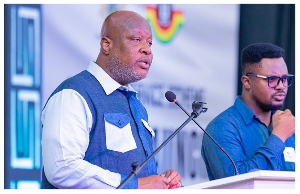A Tribute to His Majesty Otumfour Opoku Ware II, Asantehene, by Dr Charles Wereko Brobbey
The departure of Otumfuo Opoku Ware II , the fifteenth occupant of the Golden Stool of the Asante nation, was formally announced by the Kumasi Traditional Council, one week after the actual event occurred. In the end, the confusion that has surrounded the manner in which the world was informed of the King's 'departure to his village' reflected the tensions and uncertainties of a people who have had to subjugate their powerful kingdom and its very rich cultural heritage within the confines of the modern nation state of Ghana and the increasingly shrinking international Global Village. That the late Otumfuo Opoku Ware II succeeded in the onerous task of asserting his kingdom's relevance in the modern world was demonstrated by the fulsome obituary published in The New York Times last Thursday.
There is no doubt that similar tributes will be published by many of the great newspapers of the world, such as The Times of London. It does seem a touch incongruous therefore to see the wider world recognising the passing of a great leader when who are affected are busily engaged in a national debate about the propriety of our own media apparently 'jumping the gun' in a patently blatant disregard to established traditions. Long after the polemics have died down, the lesson we will all have learnt from the debate on tradition versus modernism will be a reinforcement of the wonderful achievement of Otumfuo Opoku Ware II in modernizing the Kingdom of Asante without compromising on its essential beliefs and value systems.
Otumfuo Opoku Ware II, became the 15th occupant of the Golden Stool on 27 July, 1970. He succeeded his Uncle Otumfuo Osei Agyeman Prempeh II. This was a hard act to follow in many senses. Nana Osei Agyeman Prempeh II had been an enormously popular King with his people. He persuaded the Colonial administration to restore the Kingdom of Asante in 1935 following its annexation in 1896. He had been instrumental in articulating and defending what he perceived to be the rightful place and role of the Asante nation in the new state of Ghana. For many Asantes, Osei Kyeretwie was their kind of King, assertive, combative, passionate and fiercely loyal to his people.
However, the fact was that by the time Otumfuo Opoku Ware II became King of the Asante nation, the realities of Asante as an integral part of Ghana had been truly established. The foundations of the governance of the newly independent nation had already been shaken by the injection of a non-elected government in 1966 which had given birth to a second attempt at democratic rule by the time Mr. John Matthew Poku, Ghana's Ambassador-designate to Italy was transformed into Otumfuo Opoku Ware II. The appointment to serve his new nation abroad capped several years of distinguished public service to his Kingdom and modern nation, culminating in his appointment as Minister of Communications.
As one who was born and grew up in Kumasi, I was privileged to have interacted with the late Otumfuo for many years. As Nana Poku, he and his wonderful wife, the late Aunty Vic, were close personal friends of my mother. His wonderfully genial manner was in great contrast to and very much complemented the very forthright and effusive character of our dear Auntie Vic. All who knew and came into contact with Nana Poku were struck by the simple demeanour, absolute courtesy to all he encountered, consummate diplomacy at all times and above all, a lasting impression of a very sensitive and caring man whose principal pre-occupation was for all to live at peace with each other. I still remember our visits to his Asokwa home as some of the high points in my formative years.
The calm character and dignified manner of Nana Poku was absolutely at odds with the general boisterousness and legendary loudness of his people. Also, given the endemic perception and feeling that Asantes had been dealt a raw deal in the emergence of the modern state of Ghana, very few would have betted on his succeeding Osei Kyeretwie. The odds seemed to favour a new King in the same mold as the former. And yet, when the Otumfuo Prempeh II went to his village, it was remarkable that Nana Poku was the unanimous first choice to lead the Asante nation into the uncertain and often murky waters of coping with the notion of 'co-existence within a modern state and a system of government in which the Asantehene's authority was, at least on paper, subject to another.
There is no question that Otumfuo Opoku Ware II recognised that the principal challenge of his rein was to demonstrate the continuing legitimacy of the values, culture and traditions of the Asante nation within the modern world. For him the way forward was not to try to fight the tide of modernism by asserting the territorial integrity of the nation or insisting on the retention of formal rights and powers over his people. Rather, Otumfuo Opoku Ware II set out to show that the values and culture of his nation could add richness and dignity to the modern ways of doing things. For the new King, Asante's future lay in emphasizing the positive elements of its glorious past, especially in patiently opening the eyes of the peoples of other nations to the very intricate and sophisticated humanist undertones of the culture and traditions which had been built and nourished for almost 300 years.
I recall with great pride the wonderfully splendid occasion in London in 1980 when Otumfuo opened the Asante, Kingdom of Gold exhibition at the Museum of Mankind in Piccadilly. The full pomp and pageantry of the Asante nation was put on display. The exhibition run for several months, with at least two or three extensions to its duration. So successful was the London exhibition that the Big Apple, New York, was forced to organise a similar one which was also formally opened by Otumfuo Opoku Ware II. Today, many cities in Europe and America have come to recognise the legitimacy and relevance of our customs and traditions by giving formal recognition to and involving our 'diaspora' Asantefo hene in their local government systems.
The celebrations of the Silver Jubilee of Otumfuo Opoku Ware II's reign in 1995 was the most compelling testimony to the success of his efforts at presenting the new and modern face of the Asante nation. The Celebrations' theme of 'Peace and Progress, chosen by the Otumfuo himself, managed to capture both the gentleness of the physical giant and his overriding desire for all of the people who reside in his domain to succeed in their endeavours. That Ashanti has remained peaceful and united in a turbulent world of violent change and social upheaval will come to be recognized as a most remarkable and lasting testimony to the wise counsel and able leadership of Otumfuo.
In assessing the achievements of great people, many people look for the obvious; giant infrastructural monuments that usually deify the personality of the ruler but are disguised as adding to the general well being of the people, grand conquests and annexations of other people's lands, magnificent and opulent celebrations of personal milestones, and in the context of the times in which we live, grand posturing and assertion of traditional power against the formal state authority.
The reign of Otumfuo Opoku Ware II 's reign does not lay claim to any of these grand symbols. For him, the most important thing was to see to the general improvement in the welfare of his people, which was best nurtured in an environment of peace which would facilitate development and progress of the people. The Kingdom of Asante has been peaceful and made good progress within the modern nation state of Ghana that has been vacillating between peace and insurrection, progress and retardation over the same period. The 29 years reign of Otumfuo Opoku Ware II, had eight different governments of Ghana It is the more remarkable achievement that the violence and mayhem that has characterised much of Ghana's life has not led to a revolt of the Asante nation to date.
Some Asantes characterised Otumfuo's peaceful approach as something of an unacceptable weakness in the occupant of the Golden Stool. There were many of those who agitated for the Asantes to demonstrate their might and assert their authority during some very critical moments in our recent past. For example, many saw the killings of the senior public officers who were in 1979 and 1982 as an anti-Asante act, given that General Acheampong, General Afrifa, Yaw Boakye, Justice Cecilia Koranteng-Addo and Justice Agyepong, all of blessed memory, were Asantes. When future generations read of the history of Ghana over the period of Otumfuo's reign, they will marvel at how it was that Asante remained a part of Ghana in these very difficult and trying times.
The peaceful co-existence of the various ethnic communities in Kumasi must, at least for me, be the pinnacle of the many achievements of Otumfuo Opoku Ware II. It was thoroughly deserving that he was crowned 'The Rainbow King' by the Anglican Church on the occasion of the celebration of the Silver Jubilee of his reign. From holding together of his own, Otumfuo has offered himself time and time again as the focal point for the resolution of conflicts in this country. When all seemed to break at the helm after the 1992 elections, Otumfuo displayed remarkable courage and statesmanship to avoid the almost certain outbreak of a civil war. His wise counsel facilitated the initial breakthrough in the negotiations to resolve the ethnic conflicts of in Northern Region of Ghana.
Of course, Otumfuo Opoku Ware II was not all success and progress. There were aspects of his reign which have left a tough legacy for his successor to address. The interminable chieftaincy disputes in Asante is a real source of worry for the present and future course of the Kingdom. Many of the disputes are characterised by factional violence which pose a major threat to shattering the peace and general tranquility that characterised Otumfuo's reign. Not only that, there is a real danger that the marvel of my great uncle Okomfo Anokye and his pal King Osei Tutu, in putting together so many fiercely independent states into the mighty Asante Kingdom, could disintegrate into undesirable secessionist states in the early years of the next century.
Nevertheless, the little blemishes cannot diminish the remarkable achievements and contributions of Otumfuo Opoku Ware II to the development of Asante in particular and Ghana in general during his long rule. His life achievement was given wide international recognition by the enormous global interest and support during the Silver Jubilee celebrations in 1995. It is a testament of his success in blending the tradition with the leading edge of modernism that CNN, that indomitable pillar of instant news reportage, carried the Great Durbar live for the whole world to marvel at the new power of the Asante nation as one of the few remaining depositories of great culture and traditions.
I last saw Otumfuo on 22 December 1998, when I visited the Manhyia Palace to extend my very best wishes to him for Christmas and rejoice with him over his wonderful re turn good health. He was at the top of his wit ,poking fun at the message of my Christmas card and asking whether I was not trying to bite on too much. I left him with the assured confidence that Otumfuo Opoku Ware II would be there to steer the Asante nation through this final year of the old century to cope with the challenges of the new millennium. It was not to be. That is the decision of the Ultimate Decider and we must learn to accept it even as we grieve for the loss of a great leader and father to Asante and Ghana.
There can be no more fitting epitaph to Otumfuo Opoku Ware II than those of his friend and biographer, Professor Ivor Wilks, who described his reign as Asantehene as " not so much he who sought it but who deserved it".
May the soul of Otumfuo Opoku Ware II rest in perfect peace.












